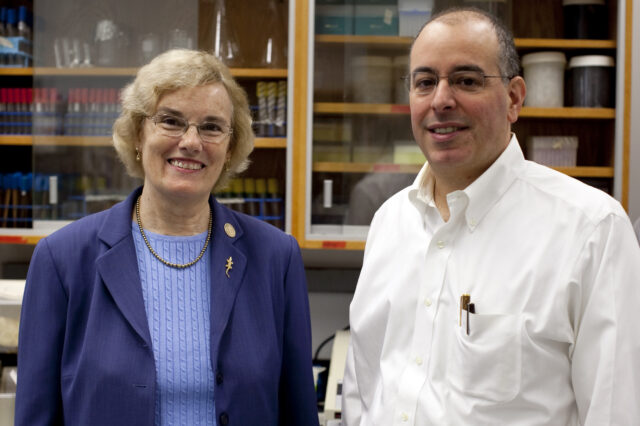Grant to help rural students find path to careers in science

Richard Snyder, Ph.D., a co-principal investigator on the grant and director of the UF Center of Excellence for Regenerative Health Biotechnology and Mary Jo Koroly, Ph.D., the principal investigator on the grant and director of the UF Center for Precollegiate Education and Training. (Photo by Sarah Kiewel/University of Florida)
To help more high school students from rural areas of Florida get on the path toward careers in science and technology, University of Florida researchers are targeting the adults at the front of the classroom first.
UF researchers have received an $808,000 Science Education Partnership Award from the National Institutes of Health's National Center for Research Resources to fund a program that will help teachers in rural school districts expose students to the sciences and better prepare them to pursue education and careers in the field of biomedical sciences.
"We're trying to show (students) that there are multiple pathways to science careers so they can make educated decisions," said Richard Snyder, Ph.D., a co-principal investigator on the grant and director of the UF Center of Excellence for Regenerative Health Biotechnology. "It really begins with educating the teachers, and with this program teachers are not just getting up to speed, they will be able to teach and guide students in the state of the art."
Often, teachers and students don't know about the variety of careers available in science and technology.
This can limit a student's perspective before he or she even starts college, said Mary Jo Koroly, Ph.D., the principal investigator on the grant and director of the UF Center for Precollegiate Education and Training. Because of this lack of knowledge about science and biotechnology careers, some students never even consider pursuing these fields, she added.
"We want to show students that science is fun and exciting and that there is a place for them even if they don't want to be physicians or Ph.D.s," Koroly said. "Rural Florida is so underrepresented in Florida's colleges and universities. We want students to know there are tremendous opportunities out there, and they can succeed if they are interested."
Unfortunately, schools have limited resources — particularly in rural areas — making it more difficult for teachers to expose students to the latest research areas, the newest technology and scientific equipment, and how it all applies to different scientific fields, Koroly said.
UF's program will bring teachers to the university for a summer institute, where they will learn about translational research — the practice of translating scientific discoveries into technologies and treatments that can help patients. The teachers, who receive three graduate credits for their work, will spend time in labs and will develop action research proposals to use what they have learned in their own classrooms, Koroly said. Teachers also will be able to borrow modern equipment to use in their science classes.
Eventually, the teachers will come back to UF to present what they did and will have an opportunity to bring some of their students to campus. This allows students to visit real labs and see what being a researcher is actually like. Snyder says this helps demystify science for students, particularly when meeting graduate students who aren't much older than them.
With Florida heavily invested in becoming a world leader in biotechnology, educated professionals will be needed to fill jobs created as companies set up shop in the state. Because many more jobs will be available in these areas in the future, pursuing science and technology could prove to be a wise choice for students, Snyder said.
"Personnel at every level are needed," he said.
Although this latest program is primarily targeting rural schools in North Florida and in Florida's Panhandle, the researchers previously have organized similar programs for teachers in other parts of the state. UF's Center for Precollegiate Education and Training also holds a Mini Medical School program each year, bringing in teachers from across the state to learn about new areas of research and to visit UF labs.
"We wanted to make it so teachers are our partners, whether they are teaching students who choose career pathways or the academic ladder," Koroly said. "If we, as scientists, provide them with current information, equipment and support, then together we can make a big difference in improving science teaching and learning and help inspire and excite students to seek higher levels of education and careers in the bench-to-bedside continuum."